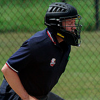Very weird type 1 obstruction play, Brewers manager ejected
Umpire-Empire locks topics which have not been active in the last year. The thread you are viewing hasn't been active in 2777 days so you will not be able to post. We do recommend you starting a new topic to find out what's new in the world of umpiring.
-
Similar Content
-
- 23 answers
- 2,521 views
-
- 4 replies
- 1,577 views
-
Obstruction / Interference with Protected /Unprotected Fielder
By jms1425,
- protected fielder
- batter-runner
- (and 2 more)
- 7 replies
- 2,585 views
-
- 5 answers
- 2,108 views
-
- 9 answers
- 2,410 views
-


Recommended Posts